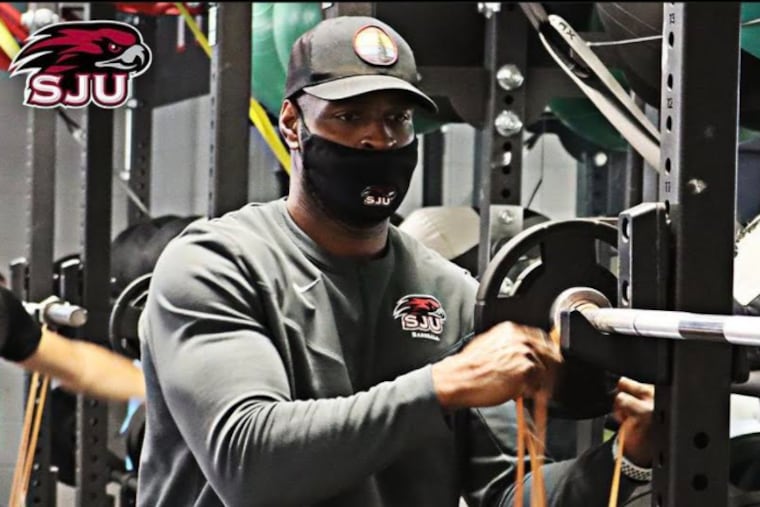Jeff Eveillard working to make St. Joseph’s University athletes better, faster, stronger
More strength, in terms of sheer muscle power, isn't necessarily what certain athletes need to be successful. Eveillard focuses on different factors to help push improved performances.

Weightlifting doesn’t automatically make an athlete better at any sport. In fact, if it’s not done correctly, it can actually make them worse.
Strength coach Jeff Eveillard, in his first year at St. Joseph’s University, knew more had to be done to maximize the potential of his athletes.
“I look at strength and conditioning like buckets,” Eveillard said. “There’s a bucket of strength that you need. There’s a bucket of power that you need. And there’s a bucket of speed and a bucket of agility that you need.”
When he first arrived at St. Joe’s during the fall semester, Eveillard used the bucket analogy to plan a workout program that could benefit each athlete. He assessed individual athletes and programs.
“I felt like [for baseball,] our bucket of strength was already full, and now it was time to work on speed and power development,” he said.
Not all teams are created equal, of course. St. Joseph’s has 18 teams and Eveillard works with athletes in four of them: women’s basketball, women’s lacrosse, men’s soccer, and baseball.
For women’s basketball, strength training was an important way to address certain weaknesses before the season started.
“For basketball, I look at injuries from the previous year and I’ll say, we probably need to get our ankles right and we probably need to get our hips stronger,” Eveillard said.
Eveillard’s knowledge and passion for the weight room started when he was a basketball player at Lock Haven University.
“I played somewhat my first semester. And then I got into the weight room.” Eveillard said. “I didn’t really know what I was doing. But it did translate to the basketball court. Then, the next year I went on to get a full athletic scholarship and got my entire tuition paid for. I credit a lot of that to strength and conditioning.”
As his experience in the weight room grew, Eveillard learned it was crucial to have a workout plan based on each sport. “As I got into [strength and conditioning], I realized there’s levels to it. It’s not just about bodybuilding,” he said.
Eveillard mentioned that a typical bodybuilder-style workout can be a common problem in the training regimen for certain athletes.
“It’s completely different. I understand the idea of wanting to look good in your shirt. But this is performance training,” he said. “And then I just dive deeper into the science and how it works.”
Eveillard uses Sparta Science health technology to take athletes through numerous assessments that give him a blueprint of an athlete’s physical makeup. This allows Sparta to create suggestions on what an athlete should focus on improving.
“Sparta measures your vertical jump and it shows you how you produce force,” Eveillard said. “So, if a guy just doesn’t produce enough force, Sparta will give us exercise recommendations for that.”
During the fall semester, Eveillard’s targeted workout plans paid off for almost every athlete. “What I’ve seen across the board, virtually everyone’s vertical jump has gone up,” he said. “I see athletes getting faster; I see athletes getting stronger.”
Eveillard shows up to work at 5:30 a.m. twice a week to train the Hawks baseball players. He also travels with the women’s basketball team. His dedication is fueled by the results he observes.
“It’s fun to see athletes getting better and see athletes are into the workouts. They’re motivated to just keep getting better,” he said.